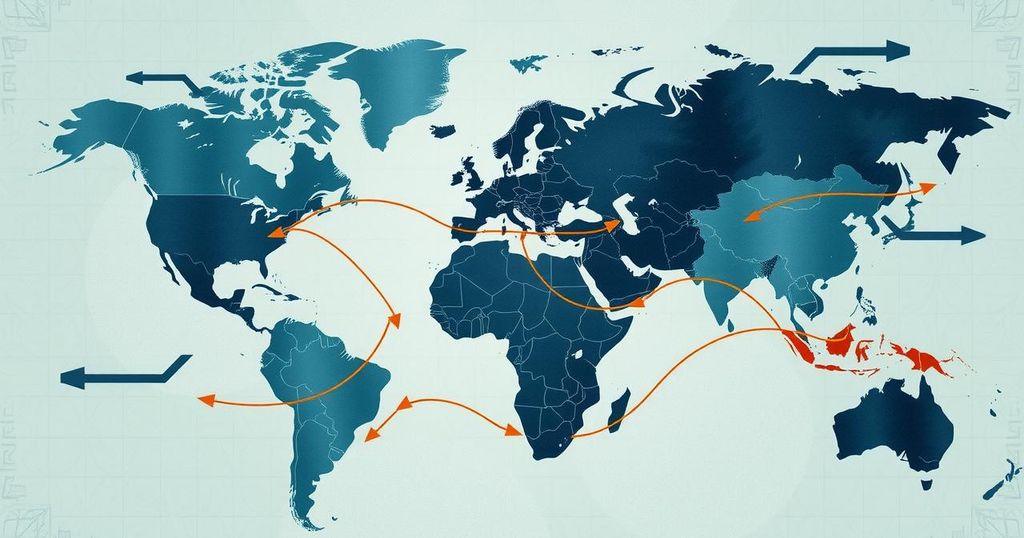Analyzing President Trump’s Foreign Policy and Trade Strategy: Promises and Outcomes
President Trump’s foreign policy reflects bold promises with limited outcomes. His strategies in Ukraine, the Middle East, and the trade conflict with China illustrate a pattern of oversimplification and failure to achieve lasting diplomatic solutions. This has led to strained alliances and ongoing conflicts, casting doubt on the effectiveness of his administration’s approaches.
As the second term of President Donald Trump approaches the notable milestone of his first 100 days, his foreign policy appears impulsive and largely ineffective in addressing global challenges or reshaping international trade to benefit the United States. Despite Trump’s assurances of quickly ending the war in Ukraine, Russia continues its military operations against Ukrainian territories. Similarly, in the Middle East, Israel remains engaged in aggressive military actions against Palestinians, disregarding recent ceasefires. Moreover, the trade conflict with China persists, with no indications of resolution, underscoring a pattern of overconfidence and oversimplification in Trump’s foreign policy dealings.
In Ukraine, Trump aimed for a swift resolution of the conflict, banking on his relationship with Russian President Vladimir Putin. His strategy proposed a quick ceasefire and territorial concessions while reducing military aid to Ukraine. However, Putin dismissed the ceasefire plan, and Ukrainians steadfastly refuse to surrender any territories, including Crimea. Trump’s underestimation of the conflict’s complexities and the firm positions of the involved parties illustrates a misguided approach to diplomacy.
Trump’s reliance on personal negotiations instead of understanding geopolitical nuances has alienated NATO allies and supporters of Ukraine. His exclusion of Ukraine from discussions held in Saudi Arabia signals marginalization of Kyiv, causing concern among US allies. Critics argue that Trump’s strategies enable Russian aggression by rewarding it with territorial control, risking international unity against future conflicts.
In the context of the Gaza conflict, Trump sought to strengthen his legacy using the Abraham Accords, which normalized relations between Israel and several Arab states. Despite this diplomatic shift, the Palestinian issue remains unaddressed, with Trump’s pro-Israel actions exacerbating tensions. His relocation of the US Embassy to Jerusalem and other contentious moves have intensified the humanitarian crisis, with significant civilian casualties reported.
Trump’s recent controversial suggestion to relocate Gazans to Egypt and Jordan further illustrates his lack of understanding of the conflict’s intricacies. By referring to this proposal as a mere recommendation, he demonstrated a transactional mindset that neglects the deep-rooted issues at stake, thereby tarnishing the United States’ role as a mediator in international conflicts.
At the core of Trump’s “America First” strategy is his tariff policy aimed at reducing the trade deficit and fostering domestic investment. Critics contend that these tariffs disrupt global supply chains without providing substantial economic benefits. The trade war with China has produced significant retaliatory tariffs, contributing to rising prices for US consumers and leading to adverse effects on domestic markets. Although Trump has made concessions by lowering tariffs on certain electronics, these measures alone are unlikely to mitigate the economic disturbances resulting from his policies.
With China managing to lessen its reliance on the US market by expanding into Southeast Asia and Europe, it appears better positioned to withstand the trade war’s repercussions. The relocation of Chinese factories to evade US tariffs also reflects a strategic adaptation to the economic landscape. Conversely, the United States faces challenges as domestic industries contend with supply chain interruptions and escalating production costs, raising questions about the effectiveness of Trump’s trade approaches in ensuring long-term economic stability.
Overall, President Trump’s foreign policy and trade strategies resonate with a consistent pattern of grand promises yet minimal outcomes. His transactional tendencies, marked by hasty decisions and simplistic solutions, have estranged allies, deepened international discord, and jeopardized economic stability. From ongoing conflicts in Ukraine and Gaza to the trade dispute with China, Trump’s initiatives emphasize short-term objectives over enduring resolutions, calling into question both his global leadership and the coherence of his administration’s foreign relations framework.
In summary, President Trump’s second term has revealed a foreign policy characterized by ambitious declarations but limited achievements. His approach has led to deteriorated international relationships and unresolved conflicts, particularly in Ukraine and the Middle East, while trade strategies have proven disruptive without offering meaningful benefits. The transactional nature of his diplomacy raises concerns regarding the long-term effectiveness of his administration’s efforts and its implications for the broader geopolitical landscape.
Original Source: risingnepaldaily.com




Post Comment